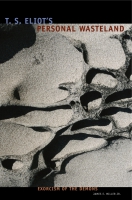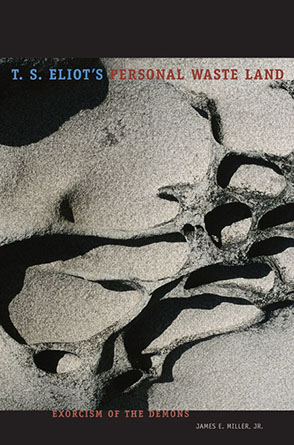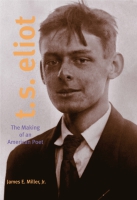T. S. Eliot's Personal Waste Land
Exorcism of the Demons
James E. Miller Jr.
“James E. Miller, Jr. has accomplished the seemingly impossible—given a radically new reading of The Waste Land. The hitherto well-kept secret of Eliot's friendship with Jean Verdenal, the effect of this friendship and of Verdenal's death [at Gallipoli] upon Eliot's attitude to women, its almost disastrous effect on his creativity, the references to Verdenal in The Waste Land and Four Quartets, are here explored for the first time. We may take exception to some of Miller's interpretations, but his facts are incontrovertible. There can be no doubt that The Waste Land is, above all, a personal utterance, as Eliot said it was and Miller shows. Any serious study of this most famous poem, from this time on, will have to take into account T. S. Eliot's Personal Waste Land.”
- Description
- Reviews
- Bio
- Subjects
While some consideration is given to the early, confession-like "Ode" (later suppressed), and to the famous "familiar compound ghost" of the later Four Quartets, primary attention is focused on the original drafts of The Waste Land. The poem emerges from a meticulous and detailed reading of the manuscripts as indeed a kind of elegy for a dead friend, with links to Tennyson's In Memoriam and Whitman's "When Lilacs Last in the Dooryard Bloom'd," and thus not a piece of "social criticism" but an expression of anguish and pain and despair working toward resignation, resolution, and reconciliation.
It becomes clear that this interpretation is not dependent on biographical conjecture and reconstruction, but flows inevitably from simple close scrutiny of the intricate evolution of The Waste Land; therefore the firm establishment of the full facts of Eliot's early life is unnecessary to this "meaning." In following Eliot's own frequent hints, this book offers a vital corrective to all the previous readings (or misreadings) of The Waste Land, and has important implications for the entire Modernist Movement.
“James E. Miller, Jr. has accomplished the seemingly impossible—given a radically new reading of The Waste Land. The hitherto well-kept secret of Eliot's friendship with Jean Verdenal, the effect of this friendship and of Verdenal's death [at Gallipoli] upon Eliot's attitude to women, its almost disastrous effect on his creativity, the references to Verdenal in The Waste Land and Four Quartets, are here explored for the first time. We may take exception to some of Miller's interpretations, but his facts are incontrovertible. There can be no doubt that The Waste Land is, above all, a personal utterance, as Eliot said it was and Miller shows. Any serious study of this most famous poem, from this time on, will have to take into account T. S. Eliot's Personal Waste Land.”
“Any book that honestly attempts to reveal a coherence in Eliot's Waste Land is to be applauded. Basing his findings on the original text, Mr. Miller presents a firm thesis, which will be widely discussed. Whatever be the exact truth, Eliot comes out of it well. In place of a bland know-all throwing off enigmas to baffle ardent disciples, we are invited to watch a tormented soul striving through great poetry towards spiritual self-mastery.”
“[T]he best study thus far of the new Waste Land revealed in 1971 when the facsimile edition of the original manuscripts appeared.”
“James E. Miller Jr. has written a stimulating and important book. Not only does it succeed in yielding a significantly new interpretation of T. S. Eliot’s The Waste Land; it also demonstrates the manner in which biographical material can be tactfully used to enrich literary criticism. Miller effectively demolishes the last vestiges of the determined efforts of the New Critics to separate a poet from his poem.”
James E. Miller Jr. is the Helen A. Regenstein Professor Emeritus of English at the University of Chicago. His most recent book, T. S. Eliot: The Making of an American Poet, 1888–1922, was published by Penn State Press in 2005. Miller's other books include The American Quest for a Supreme Fiction: Whitman's Legacy in the Personal Epic (1979) and Leaves of Grass: America's Lyric-Epic of Self and Democracy (1992).
Mailing List
Subscribe to our mailing list and be notified about new titles, journals and catalogs.





